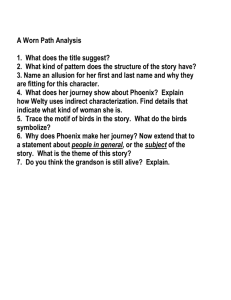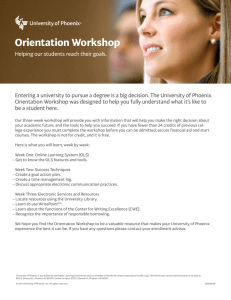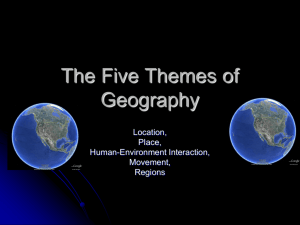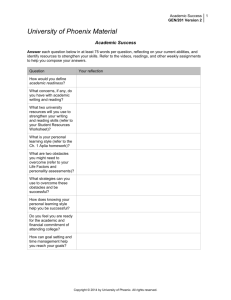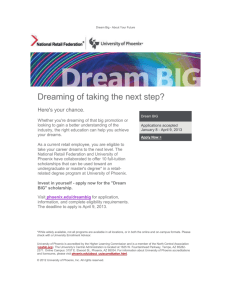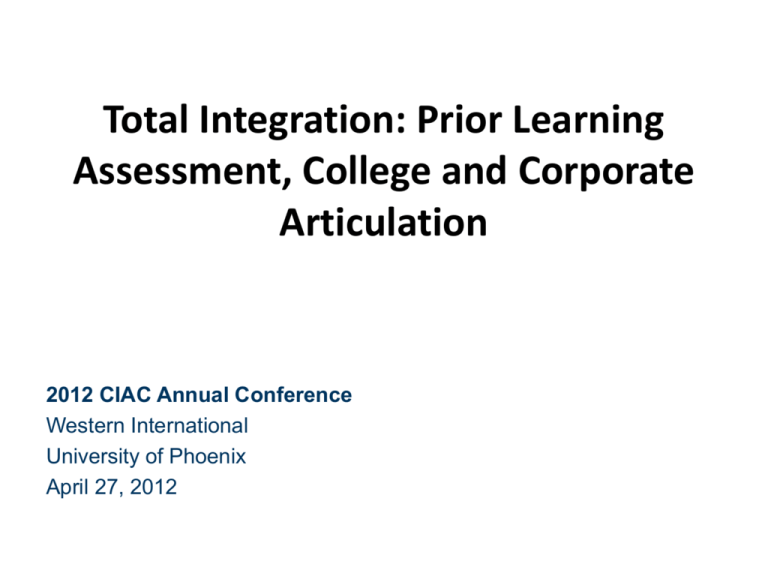
Total Integration: Prior Learning
Assessment, College and Corporate
Articulation
2012 CIAC Annual Conference
Western International
University of Phoenix
April 27, 2012
ABOUT WESTERN INTERNATIONAL
UNIVERSITY
The West Story
1978
Western International
University was founded in
Phoenix, AZ
2002
Launched Interactive
Online Program
1984
Accredited by The Higher
Learning Commission
2010
Became part of Apollo Global, a consolidated
subsidiary of Apollo Group, and joined with
sister schools in the United Kingdom, Chile,
and Mexico
Today: Campuses are located in Phoenix, Chandler, and Scottsdale, Arizona and
wherever you are with our West Interactive Online campus
Phoenix, AZ
Chandler, AZ
Scottsdale, AZ
Why Students and Corporations Choose to Go West
Global
Perspective
Inspiring
Teachers
Online Classes
Replicate Campus
Experience
International
Curriculum
Maximum
Flexibility
Support Services
Small
Class Size
Prior Learning
Assessment
CORPORATE ARTICULATION
Why Implement Corporate Articulation:
•
To build a skilled and knowledgeable workforce
•
To increase productivity and employee retention
•
To grant their employees college level credit for corporate trainings and
certifications
•
To strengthen employee loyalties and aid in succession planning, retaining
employees who are eager to improve their skills with educational development
•
To add value to internal training programs by giving the reward of college credit as
an extra benefit
•
To help control corporation’s overhead on educational costs.
How West Partners with Corporate Organizations
• Our dedicated Corporate Education Department:
– Creates and grows strategic relationships
– Fosters integrity and social responsibility
– Focuses on partnering with corporate organizations that change lives through
education
• Through discovery meetings our Corporate Education Liaisons work in
concert with the organization to identify which opportunities will benefit the
partner organization the most
– Opportunities may include:
•
•
•
•
•
Providing services onsite
Educational attainment surveys
Community workforce development events
Workshops
Benefits fairs
Corporate Articulation Workflow
Develop list of
corporate
organizations who
would benefit from
West’s services
Schedule discovery
meeting with
organization
Create original
proposal based on
meeting outcomes
Upon corporate
approval, West
creates and presents
service agreement
PLA begins the
evaluation process
All departments are
alerted about the new
agreement
Service agreement
tracked on SharePoint
site
Accomplishments
14 service agreements that
reach an employee base of
76,000 employees
52 discovery meetings took
place between our department
and prospect organizations
The CEL department participated
in 218 onsite service
opportunities and 93 community
events
What We Learned
•
Discovery meetings are essential to
creating meaningful partnerships.
We needed a secure internal platform
where we could store and share the
partnership agreements with other
departments.
In particular, it is important to research and specifically
address:
•
What are the organization’s particular needs?
•
What benefits are most appealing?
•
How can we help reduce tuition costs?
•
How can we help apply college level learning
towards degree programs?
• Created a SharePoint site where we could house the
agreements and send alerts to the various departments
as the partnerships are approved.
PRIOR LEARNING ASSESSMENT
What is Prior Learning Assessment?
•
Prior Learning Assessment (PLA) is:
–
–
•
An alternative way to evaluate college-level knowledge which students have acquired outside the
traditional college classroom
Two Services: Professional Training and Experiential Essays
Opportunities for credit may include (and are not limited to):
–
–
–
–
–
Licenses
Professional certificates
American Council on Education
National College Credit Recommendation Service
And more…
Why Implement PLA?
•
To recognize working adult students’ accomplishments outside of the
classroom via potential credit that can be applied towards a degree
•
Studies have shown that offering PLA may increase graduation rates and
help with student retention
•
It is a service to students that is tangible and can truly assist them
How PLA Was Implemented at West
Developed
overarching strategy
for the department
Obtained buy in from
Deans, Faculty,
Academic Affairs staff,
and other decision
makers
Researched how other
schools are using PLA
with their students.
Aligned West’s PLA
standards with
Admissions
Department policies
Developed
communication plan
and training materials
Tested systems and
procedures
Mapped out process
and standard
operating procedures
Met with other
departments to assess
how PLA would affect
them
Program was released
Accomplishments in Year One
In the first year
West had 4% of
their students use
PLA
Pre-evaluations
for potential
students and
current students.
Incorporated
Bloom’s
Taxonomy into
the evaluation
process.
Developed robust
faculty training
program.
Began a series of
monthly online
student
workshops and
onsite
workshops at the
companies in
order to promote
the program.
What We Learned
Having properly educated faculty and
evaluators is critical to the success of the
program.
•
•
Quickly implemented a robust training program for
faculty evaluators.
Added the use of Bloom’s Taxonomy in order to add
rigor and consistency to the evaluations.
There are specific reporting needs that
should be addressed in order to validate
PLA services.
• Via a SharePoint site, we have created a workflow and
ticket system to track all requests and processes.
• This has given us the ability to track the number of files
processed, pre-evaluations, phone calls, credits
awarded, grad team submissions, and turnaround time
• This validates the use of PLA, which counselors or Grad
Teams are using it, and any trends we notice.
Training is essential for those staff
members charged with promoting the
program.
• Implemented training for frontline counselors so that they
are able to intelligently educate students on the PLA
service.
• Deployed a series of monthly workshops that our
counselors can refer their students to in order to get prequalified and learn more about the service.
QUESTIONS?
College Articulation
Prior Learning Assessment
Corporate Articulation
Maximizing Learning to Support Credential Attainment
in a Diverse Market
Suzanne Toniny and Felicia Nepomuceno
Workforce Solutions
University of Phoenix
© 2012 University of Phoenix, Inc. All rights reserved.
19
Associate of Arts Seamless Transfer
www.phoenix.edu/communitycollege
Associate of Arts Seamless Transfer: Effective
for new students applying to University of
Phoenix on or after 09/01/2011, students who
have earned an Associate of Arts degree from
a regionally accredited community college will
be able to transfer their AA in its entirety for a
block credit transfer, instead of assessing the
credits on a course by course basis. This policy
is applicable towards programs with our
standard 54 credit General Education block.
© 2012 University of Phoenix, Inc. All rights reserved.
UOPX College Articulation: Occupational
Education Student Service
• Transfer Pathways exist for Applied Science students or other
Associate Degree types that are traditionally considered
terminal –meaning not leading to further post-secondary
studies to complete baccalaureate degrees
• Credit maximized through Transfer Programs with higher
interdisciplinary and elective credit requirements such as the
Bachelor of Science in Management or Bachelor of Science in
Psychology
• Acceptance of courses that may have vocational/professional
content providing they are taught, offered, and applicable at
the Associate’s Degree (Freshman) Level from the Previous
Institution
For more information about our on-time completion rates, the median loan debt incurred by students who complete a program and other important
information, please visit our web site at phoenix.edu/programs/gainful-employment.html
© 2012 University of Phoenix, Inc. All rights reserved.
UOPX College Articulation:
Bucket System
• Instead of requiring a specific course-to-course match for general
education and elective transfer credits, student fulfill the majority of
these credit requirements in content areas or “buckets” per the degree
requirements.
• Benefits of a bucketing system include:
o Allows for more flexibility in the acceptance of previous activity in
transfer
o Creates a transfer pathway that accommodates more degree build
designs and philosophies from multiple institution types
o Doesn’t restrict students to one set of lower division general
education curriculum requirements
© 2012 University of Phoenix, Inc. All rights reserved.
UOPX College Articulation:
Going Beyond a 2+2 With
Course Waivers
• The University defines a waiver as the substitution of a UOPX
required course with a course of the same level listed on an
official transcript from another institution.
• Students may fulfill required course of study units with
coursework completed at a community college when
requirements are met.
• Students requesting course waivers must:
– Make formal written requests to the central Office of
Admissions & Evaluation
– Utilize the Request for Course Waiver Form citing the courses
they request to be waived, the courses to be transferred into the
required course of study, and the university where the courses
were completed
– Provide an official catalog course description and an official
transcript
© 2012 University of Phoenix, Inc. All rights reserved.
Course Waivers Sample on
Transfer Pathway Document
Community College Center of
Excellence
Vision To build a world class, globally competitive workforce
through community college partnerships
Mission
1. To increase nationwide baccalaureate attainment by providing access
through University of Phoenix and community college alliances
2. To form Transfer Pathways supporting community college completion and
University enrollment
3. To create market-based Advisory Teams uniting business, academic, and
diversity leaders for performance-based outcomes
4. To provide resources allowing students to make informed workforce and
education decisions through workforce CLEAR pathway events
5. To integrate diversity and community college partners to improve student
retention through student support
© 2012 University of Phoenix, Inc. All rights reserved.
UOPX Community College
Center of Excellence Alliance
Benefits
• Tuition reduction* for University of Phoenix transfer students who
complete an associate’s degree at an alliance community college
• Tuition reduction* for employees of alliance member colleges who enter
into Bachelor’s level and above University of Phoenix program
• Student Transfer Trends and Outcomes Reporting to measure student
success and transfer credit trends
• Transfer Pathways created in focus areas that clearly outline how courses
from an associate’s degrees apply to baccalaureate programs at University
of Phoenix
• Transfer Pathways are shared with business and diversity leaders through
our UOPX P3 Initiative so more students become aware of Transfer
Pathways
• Offers the students of alliance community colleges a Prior Learning
Assessment fee waiver*
• Bridges the gap between workforce non-credit training and associate’s and
Bachelor's degree attainment
*Where available
© 2012 University of Phoenix, Inc. All rights reserved.
College Articulation: UOPX
Community College Center of
Excellence
Connecting Pathways with the Workforce Manufacturing
Example
Community College System - Certificate
Applied Science Manufacturing Certificate | Logistics Management I Basic Electronics
EMPLOYEE RETRAINING
EMPLOYEE AQUISITION
Community College System – Associate’s Degree
Associate of Applied Science Degree/Welding | Mechanical Engineering | Logistics Management
EMPLOYEE RETRAINING
EMPLOYEE AQUISITION
University – Bachelor’s Degree
Bachelor of Science in Management/Manufacturing
EMPLOYEE AQUISITION
EMPLOYEE RETRAINING
University – Master’s Degree
Master of Business Administration/Global Management
EMPLOYEE RETRAINING
EMPLOYEE AQUISITION
Manufacturing Client
Degreed, diverse future leaders exhibiting both technical & managerial skills
© 2012 University of Phoenix, Inc. All rights reserved.
27
University of Phoenix
Corporate Articulation and
Prior Learning Assessment
Aligning Workforce Expertise
with Academic Excellence
Suzanne Toniny
University of Phoenix
Articulation Specialist
© 2012 University of Phoenix, Inc. All rights reserved.
Corporate Articulation
Corporate Articulation is the formal evaluation of
internal trainings offered at a corporation or
training organization. The purpose of the
agreement is to define the amount of credit for
which corporate training is eligible when
submitted to the Prior Learning Assessment
Center (PLA).
© 2012 University of Phoenix, Inc. All rights reserved.
Credit Recommendation
Guides
A Credit Recommendation Guide is a tool outlining internal training
that has been reviewed for possible college level credit.
• Details the training courses that have been pre-evaluated and
may be applied for college credit
• Outlines General Education/Interdisciplinary equivalency and
the amount or credits recommended
• Eases the PLA submission process
© 2012 University of Phoenix, Inc. All rights reserved.
Credit Recommendation
Guide
© 2012 University of Phoenix, Inc. All rights reserved.
Transferable Training
Transferable Training Contains Academic
Theory
Examples of Transferable Topics May
Include:
•
•
•
•
•
•
Management / Leadership
Health Care / Nursing / EMT
Human Resources
Information Technology / Programming
Finance / Securities / Accounting
Real Estate / Insurance
Defining Prior Learning
Assessment (PLA)
PLA is the evaluation of learning obtained in a non-traditional
format for the transfer of credit towards a credential.
Examples may include:
• Corporate Professional Development
• Professional Training
• Coursework that did not transfer
•
accredited or unaccredited institutions, continuing education
• Experience-based Learning
© 2012 University of Phoenix, Inc. All rights reserved.
Two Main Types of Prior
Learning Assessment
•
Professional Training Portfolio (PTP): Includes formal training
such as licenses, certificates, professional development,
continuing education, etc.;
•
•
Includes submissions from pre-evaluated training resources
•
Corporate articulation (CRG)
•
Apollo QuickList
Experiential Learning Essay (ELE): Essay written about life
experiences that taught principles discussed in an approved
essay topic (students do not earn credit for the experience,
but the learning obtained through the experience.)
© 2012 University of Phoenix, Inc. All rights reserved.
Experiential Learning Essay
(ELE)
An essay that demonstrates learning and knowledge
obtained through personal and professional
experiences. (students do not earn credit for the
experience, but the learning obtained through the
experience.)
• 1, 2, and 3 Credit Essays
• Kolb’s Learning Model
• Reviewed by faculty
PLA Credit Potential
Maximum Credit Earning Potential*
Category
Bachelor’s Degree
Associate’s Degree
Professional Training
Portfolio
30
15
Experiential Learning
Essay
30
15
National Testing
Programs+
30
30
Total
60
30
*Some additional restrictions may apply by State of residence or Program selection.
+ NTPs do not require a UOPX Prior Learning Assessment evaluation and may go through the standard evaluation process
in the Office of Admission and Evaluation
© 2012 University of Phoenix, Inc. All rights reserved.
PLA Evaluation Process: Professional
Training Portfolio & Experiential
Learning Essay
Student Submits Application
Student submits online application, submission payment is verified, student receives email from PLA
Application Enters PLA Workflow
Application is placed in PLA workflow until assigned to a Portfolio Evaluator
Submission of any Missing Documentation
Student is given 20 days to submit missing or additional documentation to complete evaluation
PTP Evaluation
ELE Evaluation
• Student academic record reviewed for credit deficiency
• Evaluation results emailed to student
• Essay submissions sent to Faculty Evaluator
• Evaluation results emailed to student
Posting and Quality Assurance
Credits awarded and applied to student program
© 2012 University of Phoenix, Inc. All rights reserved.
Questions

